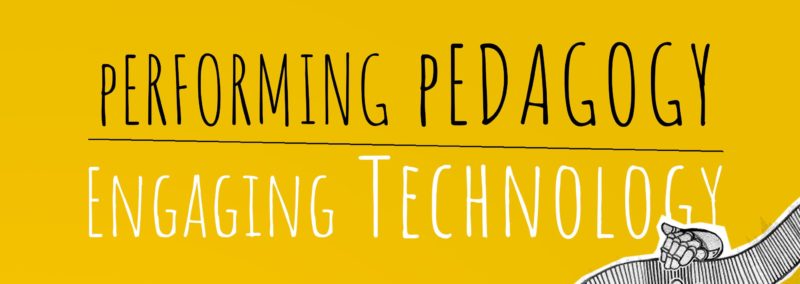Jared R.Pike: Rethinking Digital Lectures: Or, Class, the animated series
“There is never enough time!” It’s my constant refrain every semester. In every class I teach I aim to incorporate active learning techniques and to create a learning environment that encourages students to engage the course materials on the higher planes of Bloom’s Taxonomy. Unfortunately, despite my grand lesson plans and creative activities that blend history and theory with the practical act theatrical creation, every class period I end up giving a series of mini-lectures covering the basic information for the unit—leaving little to no time for any hands-on or practical application of the unit’s “big ideas.” This presentation will examine my recent attempts to use digital technology to extend valuable learning time beyond the class period and the results of student learning beyond understanding.
Ryan Donovan: Incorporating EdTech in the Arts Classroom
This presentation explores two different ways of incorporating EdTech into the Arts classroom as well as discussing how to use EdTech to enhance your pedagogy and deepen student engagement with your course.
Ashley Marinaccio: Stage Left: Socially-Engaged Pedagogy and the Digital Platform
What can theatre and performance do in “times like these”? How do digital platforms such as website, social media, and blogs, inspire and activate the audience? This presentation explores the creation and process behind Stage Left, a new web series that examines how theatre and performance function in various communities locally and globally. Stage Left is being developed as part of CUNY Graduate Center’s Interactive Technology and Pedagogy Certificate and and part of the New Media Lab projects.
Joseph Paul Hill : Modeling Care, Encouraging Advocacy: Lessons in Pedagogy from Disability Studies
Classroom instructors can quite easily provide reasonable accommodations for those students registered with an institution’s Office of Disability Services—provided such an office exists. However, the notion that only certain accommodations need to be made for particular students overlooks the very real fact that (dis)ability is situational and ever-changing. So as instructors, what can we do? This presentation will enumerate key lessons from disability studies as a means to begin reimagining a classroom environment that provides care for all learners, regardless of their ability identification. What might it look like to provide radical accommodations for all students? And how might technology assist or hinder the pursuit of this mission?
Laura Cabochan: Madame Duterte: Process Drama as an Immersive Theatrical Classroom Experience
“When I switch on the lights, the president of the Philippines will no longer be Rodrigo Duterte, but will instead be Rosario Duterte.” Using a video performance of her portraying Rodrigo Duterte, NYU Steinhardt Educational Theatre doctoral candidate Laura Cabochan designed and playtested “Madame Duterte,” a drama-in-education experience that combines verbatim theatre, process drama, and technology, with a group of teenagers from an all-girls school in Metro Manila, Philippines. The participants, playing characters of their own choosing, immersed in the alternate reality and dialogued about various concerns, such as gender and the government’s so-called “war on drugs,” through theatrical conventions integrated within the drama, including an anonymous chat room that invited the participants to use their smart devices. During this session, Laura Cabochan reflects on how, although still in its beta stage, “Madame Duterte” has the potential to be an engaging way for today’s digital generation to dialogue about issues that matter to them.
Dr. Chloë Rae Edmonson : An Instagram Experiment in #Fashion and #Pedagogy
This installation encapsulates one of Chloë’s “sartorial experiments” as a femme woman in academia. For her Theatre in New York City class during NYU’s January Term 2019, she curated a look around the themes of each class meeting (which met Monday through Thursday). She used her outfits to spark daily thematic conversations. Additionally, she shared each look on Instagram, with a short description of its significance. This experiment grew out of Chloë’s frustration with the double-standards of personal appearance and gender performance in academia; throughout her career, she has consistently received advice from peers and mentors to “be less feminine and youthful” and “be more serious.” The implication, of course, is that to be feminine and youthful is to be unserious and thereby unscholarly. LOL, whatever!


